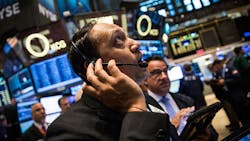Stock Market Roller Coaster Rides on After China's Rate Cut
LONDON—Global equity markets went on another rollercoaster ride Wednesday as China's interest rate cut showed little sign of calming jitters over the country's faltering economy.
Europe's main stock markets fell, with London's benchmark FTSE 100 index shedding 1.68% to close at 5,979.20 points.
In the eurozone, the CAC 40 in Paris dropped 1.4% to end at 4,501.05, points, and Frankfurt's DAX 30 fell 1.29% to 9,997.43 points.
But U.S. stocks surged higher as investors tried to snap a six-day losing streak prompted by the turmoil in the Chinese stock market.
In mid-morning trade, the Dow Jones Industrial Average stood at 15,854.51, up 1.2% on new US data showing that orders for durable goods rose a solid 2% in July.
The broad-based S&P 500 rose 2.07% to 1,906.26, while the tech-rich Nasdaq Composite Index gained 2.15% at 4,603.53.
Frazzled investors sent Europe's top indices swinging between losses and gains after a choppy session on Asian stock markets, and analysts predicted even more turbulence ahead.
'Market Rollercoaster Continues'
China's central bank on Tuesday reduced interest rates and slashed the amount of money banks need to hold in reserve--its second such tandem move in two months -- in a bid to stoke growth.
The measures are not only aimed at boosting cash flow in China, but also at reviving confidence that Beijing can steer the economy away from a hard landing and keep global growth on course.
China's slowdown has cast a dark shadow over markets because it represents around 15 percent of global economic activity--and is a top consumer of many commodities.
Analysts at the Capital Economics think tank said the worst may be over.
"Looking ahead, we ... suspect that investors will be less worried about China in due course, as it becomes apparent that her economy is not collapsing," they wrote in a note to investors.
China's benchmark stock index fell 1.27% to 2,927.29 points on Wednesday, after veering wildly between losses and gains of around 4% during the day.
Other Asian shares were mixed, with Tokyo rising 3.20%, Seoul closing up 2.57% and Sydney adding 0.69%, while Hong Kong followed Shanghai down to close 1.52% lower.
"The equity market rollercoaster continues," said TrustNet analyst Tony Cross as Frankfurt, Paris and London were down between 0.25% and 1% in mid-afternoon trades after Tuesday's strong gains.
"We're still seeing some big market swings today... (but) the rate cut from (China's) central bank was clearly not enough to put investors' concerns at ease," said Craig Elam, senior market analyst with trading firm Oanda.
Chinese stocks have lost more than 40% of their value since a year-long, debt-fuelled rally collapsed in June, prompting Beijing to unleash unprecedented market support measures, including using state-backed vehicles to buy up shares.
The new plunge in Chinese stocks sparked pandemonium on Monday, wiping about $2.7 trillion off global equities from London to Buenos Aires.
Eye on US Interest Rates
Some analysts see Beijing's handling of the market slump as a further test of the government's ability to guide the economy to a more market-oriented model after the shock devaluation of the yuan two weeks ago.
"If problems on China's financial markets and real economy deepen, and the authorities fail to contain the situation, a full-blown financial and economic crash in China could ensue," said Christophe Donay, chief strategist at Pictet Wealth Management.
"This is currently the biggest risk for the global economy and financial markets."
The People's Bank of China cut its benchmark lending and deposit interest rates by 0.25 percentage points each, and its reserve requirement ratio by 0.50 percentage points.
The bank has now cut interest rates five times since November in a bid to spur the slowing economy, as concerns mount that it may miss its 7% growth target for the year.
But international investors said more must be done to fully reassure markets, especially as the Federal Reserve is expected to raise interest rates for the first time in nearly a decade by the end of 2015.
While this week's slump in Shanghai may have a limited impact on the broader economy, it reflects some investors' views that the sky-high valuations of quoted companies are not justified.
In London foreign exchange deals, the euro weakened against the dollar at 1.1387 compared with $1.1518 late on Tuesday.
Copyright Agence France-Presse, 2015
About the Author
Agence France-Presse
Copyright Agence France-Presse, 2002-2025. AFP text, photos, graphics and logos shall not be reproduced, published, broadcast, rewritten for broadcast or publication or redistributed directly or indirectly in any medium. AFP shall not be held liable for any delays, inaccuracies, errors or omissions in any AFP content, or for any actions taken in consequence.
